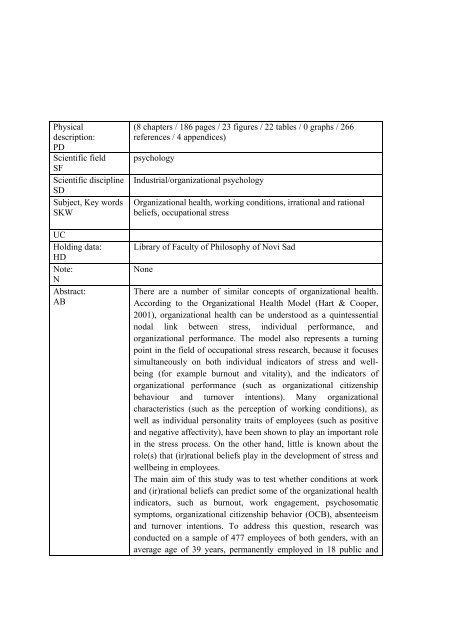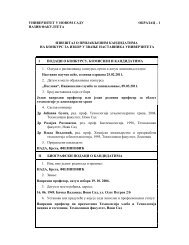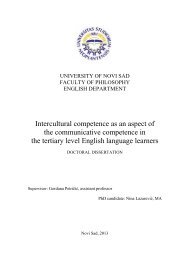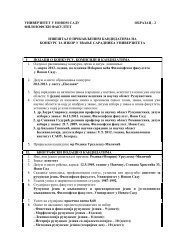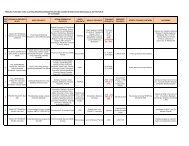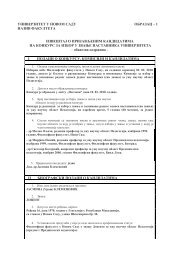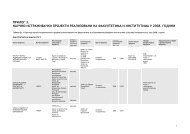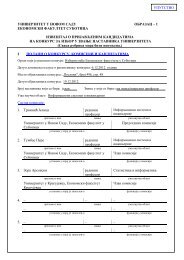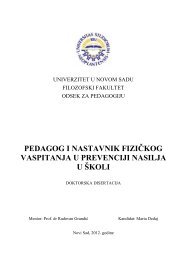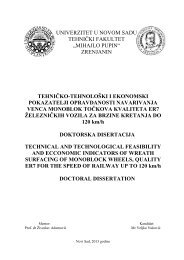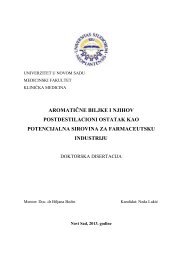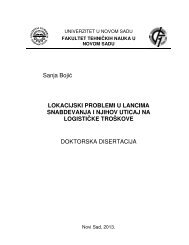Univerzitet u Novom Sadu Filozofski fakultet Odsek za psihologiju ...
Univerzitet u Novom Sadu Filozofski fakultet Odsek za psihologiju ...
Univerzitet u Novom Sadu Filozofski fakultet Odsek za psihologiju ...
Create successful ePaper yourself
Turn your PDF publications into a flip-book with our unique Google optimized e-Paper software.
Physical<br />
description:<br />
PD<br />
Scientific field<br />
SF<br />
Scientific discipline<br />
SD<br />
Subject, Key words<br />
SKW<br />
UC<br />
Holding data:<br />
HD<br />
Note:<br />
N<br />
Abstract:<br />
AB<br />
(8 chapters / 186 pages / 23 figures / 22 tables / 0 graphs / 266<br />
references / 4 appendices)<br />
psychology<br />
Industrial/organi<strong>za</strong>tional psychology<br />
Organi<strong>za</strong>tional health, working conditions, irrational and rational<br />
beliefs, occupational stress<br />
Library of Faculty of Philosophy of Novi Sad<br />
None<br />
There are a number of similar concepts of organi<strong>za</strong>tional health.<br />
According to the Organi<strong>za</strong>tional Health Model (Hart & Cooper,<br />
2001), organi<strong>za</strong>tional health can be understood as a quintessential<br />
nodal link between stress, individual performance, and<br />
organi<strong>za</strong>tional performance. The model also represents a turning<br />
point in the field of occupational stress research, because it focuses<br />
simultaneously on both individual indicators of stress and wellbeing<br />
(for example burnout and vitality), and the indicators of<br />
organi<strong>za</strong>tional performance (such as organi<strong>za</strong>tional citizenship<br />
behaviour and turnover intentions). Many organi<strong>za</strong>tional<br />
characteristics (such as the perception of working conditions), as<br />
well as individual personality traits of employees (such as positive<br />
and negative affectivity), have been shown to play an important role<br />
in the stress process. On the other hand, little is known about the<br />
role(s) that (ir)rational beliefs play in the development of stress and<br />
wellbeing in employees.<br />
The main aim of this study was to test whether conditions at work<br />
and (ir)rational beliefs can predict some of the organi<strong>za</strong>tional health<br />
indicators, such as burnout, work engagement, psychosomatic<br />
symptoms, organi<strong>za</strong>tional citizenship behavior (OCB), absenteeism<br />
and turnover intentions. To address this question, research was<br />
conducted on a sample of 477 employees of both genders, with an<br />
average age of 39 years, permanently employed in 18 public and


